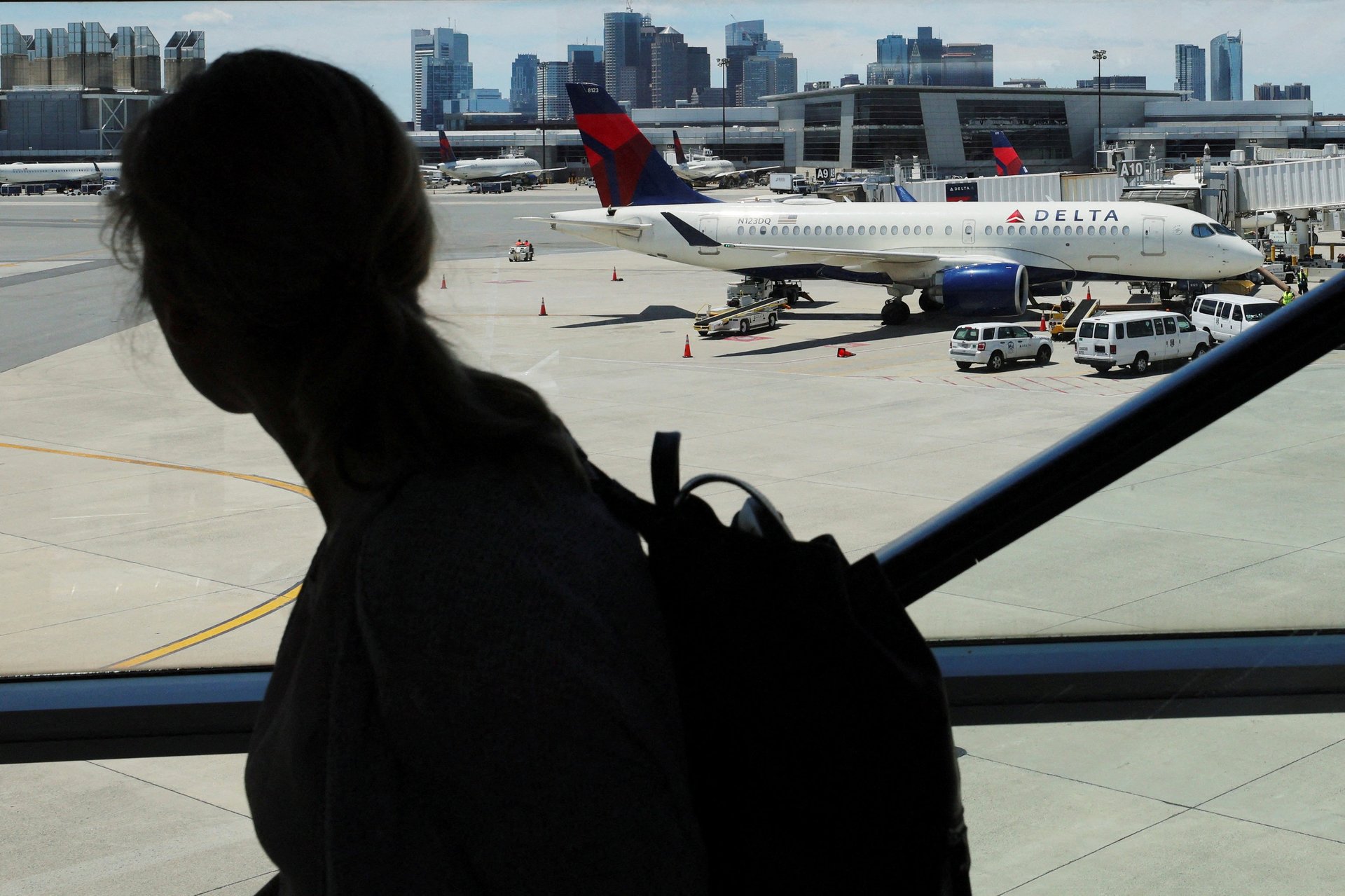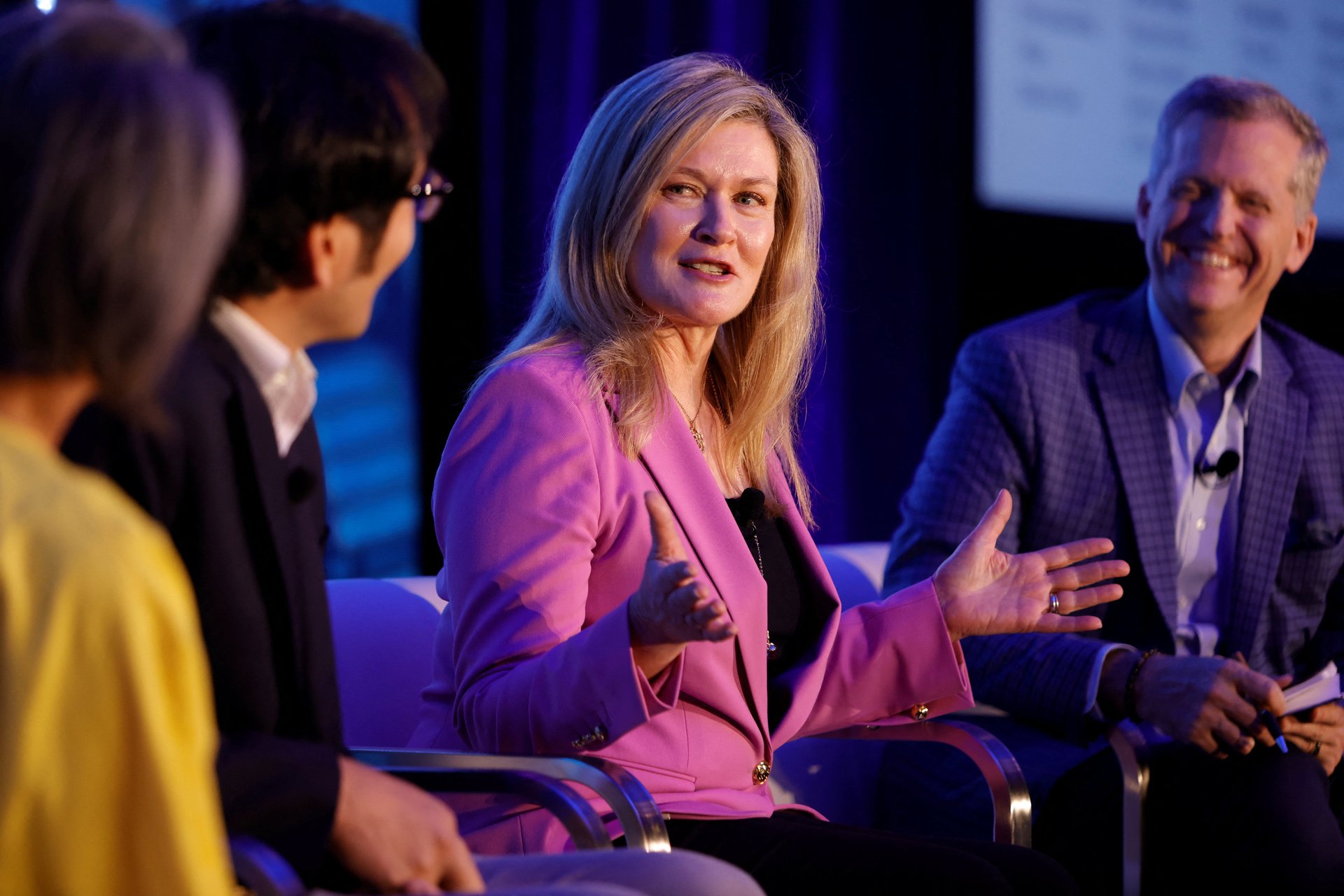Delta thinks airline carbon emissions could peak by 2025
After that, the company is uncertain of how to reach net zero by 2050

Pam Fletcher has a tough job. As the newly installed chief sustainability officer of Delta Air Lines, she’s responsible for helping the company meet its goal of reaching net zero carbon emissions by 2050. That’s a tall order for a major airline: Planes are much harder to decarbonize than other vehicles, and today the global aviation industry as a whole accounts for more emissions than Germany.
In 2020, before Fletcher joined, Delta claimed to reach “carbon neutrality” by purchasing more than $100 million in carbon offsets—a product infamous for shoddy accounting and enabling greenwashing. An analysis in October by the investor group Climate Action 100+ criticized Delta—and the other four major airlines it analyzed—for not having a credible plan to meet its climate goals.
In an interview with Quartz, Fletcher, an engineer by training, said she wants to wind down Delta’s reliance on offsets and work harder at tangibly reducing the company’s carbon footprint. That includes overhauling the fleet. Delta has been shopping for cutting-edge, fuel-efficient planes, which now represent 12% of its fleet compared to just 5% at the end of 2019. Another 335 planes are on order. But there are other near-term steps the company can take, she said, to potentially allow it to hit peak emissions by 2025.
This interview has been edited for length and clarity.
QZ: Delta and other airlines want to reach net zero emissions by 2050. But for now, the industry’s emissions are rising. What can airlines do in the immediate term to bend the curve?
Fletcher: There are things we control now that can start to make a difference. The new planes that we take delivery of are significantly more efficient than the ones we retire, so you’re actually seeing a progression as fleets get newer.
We also work on how we fly. It has to do with our routing of planes, things like single engine taxiing, things like using ground [auxiliary power units] so we don’t have to use the plane’s electricity when it is at the gate. It’s been since about the 1950s since the U.S. air traffic control system was updated, and a lot has happened since then. There’s population growth, and where people are living and where they want to fly are a lot more diverse. So there’s an opportunity to modernize, with more direct routing and smaller landing patterns.
And we are really leaning into some of the leading research that’s being done [on contrails], because if we can avoid contrail formation, that’s an immediate impact. The contrails are persistent and stay in place a long time, which contributes to warming. So our goal is to see areas of potential contrail formation [on navigational radar], and just don’t fly there. It’s usually just a minor altitude adjustment. And it could be as much as 50% of our actual greenhouse gas output.
QZ: The International Civil Aviation Organization has said that, to reach net zero by 2050, airlines need to peak emissions as soon as 2025. Does that seem possible?
Fletcher: I think that’s plausible. We’re part of ICAO and that to me makes sense. As we keep refining our operations and refreshing our fleets, it’s going to naturally drive in that direction, as long as you know that those rates outpace growth in the industry.

QZ: When it comes to sustainable aviation fuel (SAF, made from biomass or other non-fossil fuel sources), how do we kind of get more of that into the mix? Are you concerned about the industry being unable to manufacture enough of it to make a significant dent in fossil fuel consumption?
Fletcher: I would put SAF in the medium-term category because there is not enough production either in place now or even under construction to meet the needs of the industry. So our role is to create a clear demand signal to actually make that happen.
But to me, it’s almost a miracle drug. The fact that we can utilize that fuel in the assets we have today in our existing engine propulsion is incredible. So it is a big lever for the industry to meet its commitment of net zero by 2050.
Today, the SAF being produced is largely bio-based, and that is going to hit a ceiling in terms of how much is out there. There are next-generation fuels already being worked on, which will be great. But there’s a long way to go to commercial scale for what the industry needs. I don’t see any one company catalyzing everything that needs to happen to bring SAF to scale.
QZ: What about the long-term path to net zero by 2050?
Fletcher: Long term, ultimately, the technical “unlock” for long-haul flying has yet to be identified... Everything is in play, from propulsion to actual airframe design and other critical systems. There isn’t an exact line of sight today.
QZ: In the meantime, what’s the role you see for carbon offsets in this process?
Fletcher: In 2020, Delta came out with a vision on carbon neutrality largely utilizing offsets, which was the best tool available at the time. We are significantly expanding our approach, and focusing on decarbonizing our business. We think that is where our top dollars are best spent at this point in time.
QZ: So are you planning for a time when offsets go to zero or are off the table?
Fletcher: There are still a lot of unknowns in how you decarbonize aviation. If you’ve got an equation and it needs to balance, at some point the offsets are the lever that you have. But our intent right now is to work on all the actual physical processes, activities, and products to decarbonize.
QZ: What does all this look like from the perspective of your customers? Is all this R&D and spending on new fuels or other technologies going to trickle down to more expensive tickets?
Fletcher: I’m certainly not going to comment about future pricing, but if you think about those efficiencies happening year over year, that ultimately means less fuel usage. So even with a premium out there, at some point you can outrun the premium.
QZ: Can you respond to the recent assessment of corporate decarbonization strategies last month by the investor group from Climate Action 100+? Delta was one of five airlines that they assessed, finding that all of them “do not meet any criteria” in aligning their short- and medium-term GHG reduction targets, decarbonization strategy, or capital spending with the Paris Agreement. Is that a fair characterization?
Fletcher: I think 2022 has been a great year for us on building out our sustainability work. And we’ve transitioned from focusing on net zero through carbon offsets to a broad strategy to actually decarbonize. We submitted our medium- and long-term goals [to the Science-Based Targets Initiative, or SBTI, a UN-backed agency that accredits corporate climate plans]. SBTI has not validated any airline’s long-term goals, but the medium-term ones are validated, and will reduce our Scope 1 and 3 greenhouse gas emissions 45% [below 2019 levels] per revenue-ton-kilometer [an aviation metric referring to emissions generated by moving one metric ton of freight one kilometer] by 2035. So no, I wouldn’t agree with that assessment, and we anticipate portraying a different view the next time around.
